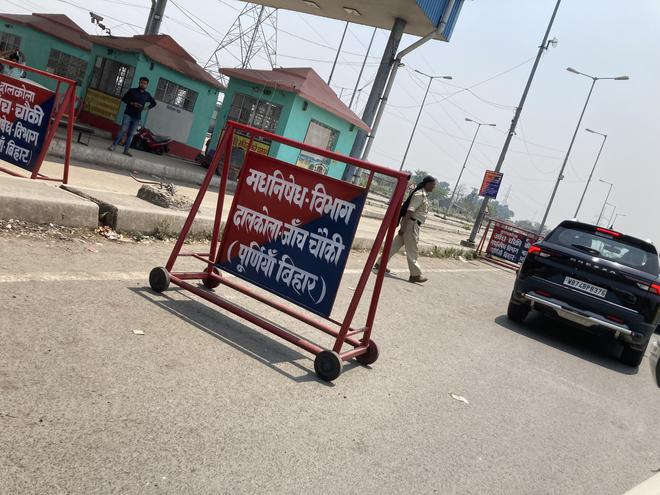In dry Bihar, the town of Dalkhola, nestled between National Highway 31 and 27 on the Purnea-Kishanganj highway, is an oasis for boozers. They stop here for a peg or two of alcohol and enjoy an overnight stay at the comfortable motels that have sprung up on a 30 km stretch of the highway before journeying on.
Since April 2016, Bihar has been a dry State, with strict penalties of jail time or fines for those violating the ban on liquor. Dalkhola is a municipality town of West Bengal’s Uttar Dinajpur district; just a small portion of the town juts into Bihar. It lies about 37 km north of Bihar’s Purnea, with Kishanganj lying almost the same distance further to the north. As one travels between the two Bihari towns, one suddenly enters little Bengal, hearing Bangla voices, seeing the Bangla script on everything from shop sign boards to vehicle numbers.
Transit point for drinkers
The display boards at the gates of the Dalkhola motels openly advertise “Beer”, “Bar”, and “Som Ras Bar”. They are all abuzz with truckers, drivers, and people travelling between Purnia and Kishanganj, all lined up to enjoy a drink.
“The place has become a major transit point for boozers,” said Mohd. Bilal, a waiter at a local motel. He has been working at the motel for nearly three years and has seen an influx of customers seeking booze and bringing a tidy cash inflow for the motel’s owner, who is said to come from Bihar but has settled in Siliguri. “The businessmen of West Bengal must be cheering for the Bihar Chief Minister for declaring Bihar a dry State,” Mr. Bilal added, with a smile on his face.
Local residents told The Hindu that the price of land has gone up manifold in Dalkhola ever since Bihar was declared a dry State in 2016. “People from Kishanganj, Purnia and other parts of Bengal too come here daily looking for a plot of land on the highway to open a hotel, a motel, a dhaba (eatery), a bar, or a liquor shop or vend,” said a middle-aged small provisional shop owner at Dalkhola. He added in the same breath, “One can’t stop them from buying plots to open these liquor kiosks to earn huge profits.”
Escaping Bihar’s liquor laws
From time to time, the Purnia and Kishanganj administrations hold meetings with West Bengal police officials at Dalkhola to urge them to cooperate in implementation of Bihar’s liquor laws. Bihar police, excise, and prohibition department officials have put up check points and barriers as one enters the stretch of the highway, searching for illicit liquor and wielding breath analysers, but they rarely catch anyone.

“Most of those who take liquor at Dalkhola stay there for a night and continue their journey next day to avoid being caught,” said an excise department official who did not want to be named, busy with a scanner in his hand at the check-point on the road towards Purnia. However, he also admitted that the influx of people staying at hotels or motels in Dalkhola have grown rapidly in the last five or six years. “Yes, it is to enjoy liquor here,” he asserted.
Also read | In dry Bihar, drunk man forgets to attend his wedding, bride calls off marriage
The private company salespersons who come to Purnia on business trips actually prefer to stay at these hotels in Dalkhola so they can enjoy their liquor at night, said van driver Biswajyoti Gupta, speaking at Purnia Mor, the point where the road turns to Dalkhola.
An edge for the TMC
In February 2024, Muslim-dominated Dalkhola also hit the headlines when the National Investigation Agency (NIA) arrested 16 people, allegedly for conspiring and carrying out a communal attack during the Ram Navmi procession in March 2023.
Ahead of the Lok Sabha poll in the second phase on April 26, the ruling Trinamool Congress party’s flags were dotted along the highway in Dalkhola, which comes under the Raiganj constituency. In the last general election in 2019, the BJP’s Debasree Chaudhury won from Raiganj, while Krishna Kalyani had won the 2021 Assembly poll from here as a BJP candidate before switching sides to the TMC in October 2021. This time, the TMC has fielded Mr. Kalyani to contest the Lok Sabha poll against the BJP’s Kartick Paul and Ali Imran Ramz (Victor) of the Congress.
The Raiganj parliamentary constituency comprises seven Assembly seats, including Raiganj. “TMC is quite strong here,” said Mr. Bilal.
Politicians in liquor trade
Even MPs and MLAs of the Seemanchal, or border areas of Bihar — comprising the four districts of Kishanganj, Purnia, Katihar, and Araria — are involved in some way or other in the illegal liquor trade, according to a senior journalist in Purnia, who did not wish to be named.
A sitting MP of this area could even lose his seat in the 2024 election as his involvement in the illicit liquor trade has become a talking point among voters, he added.







